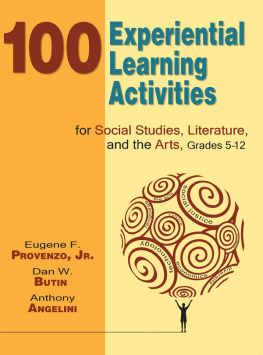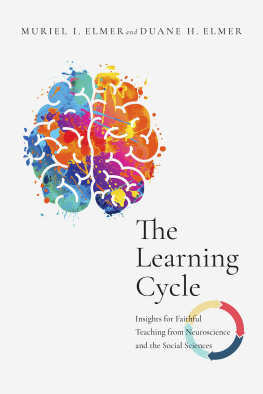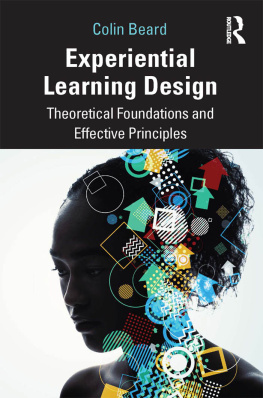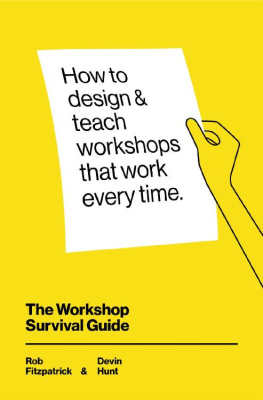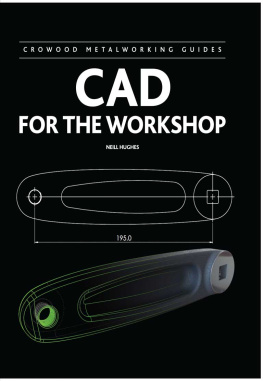Workshops
Designing and Facilitating Experiential Learning
Jeff E. Brooks-Harris
Susan R. Stock-Ward
Copyright 1999 by Sage Publications, Inc.
All rights reserved. No part of this book may be reproduced or utilized in any form or by any means, electronic or mechanical, including photocopying, recording, or by any information storage and retrieval system, without permission in writing from the publisher.
For information:
 | SAGE Publications, Inc.
2455 Teller Road
Thousand Oaks, California 91320
E-mail: |
SAGE Publications Ltd.
6 Bonhill Street
London EC2A 4PU
United Kingdom |
SAGE Publications India Pvt. Ltd.
M-32 Market
Greater Kailash I
New Delhi 110 048 India |
Printed in the United States of America
Library of Congress Cataloging-in-Publication Data
Brooks-Harris, Jeff E.
Workshops: Designing and facilitating experiential learning / by Jeff E. Brooks-Harris & Susan R. Stock-Ward,
p. cm.
Includes bibliographical references and index.
ISBN 978-0-7619-1020-6 (cloth:acid-free paper)
ISBN 978-0-7619-1021-3 (paper:acid-free paper)
1. Forums (Discussion and debate)Planning.. 2. Active learning.
3. Experiential learning. I. Stock-Ward, Susan R. II. Title.
III. Title: Designing and facilitating experiential learning.
LC6519.B76 1999
808.53ddc21
99-6167
10 09 08 9 8 7
| Acquiring Editor: | Jim Nageotte |
| Editorial Assistant: | Heidi Van Middlesworth |
| Production Editor: | Wendy Westgate |
| Editorial Assistant: | Nevair Kabakian |
| Typesetter/Designer: | Marion Warren |
| Cover Designer: | Candice Harman |
Contents
To my mother, Jeanne, and to the memory of my father, Dewey, who taught me to feel deeply and think critically; and to my wife Carolyn and my daughter Genevieve, who fill my life with joy.
J. B.-H.
To Mike and to my family, for their encouragement and tolerance of me during the process of writing this book.
S. R. S.
Preface
T he ideas in this book were developed over the past several years through attempts to clarify for ourselves and to teach others the fine art of workshop design and facilitation. The central concept of using a theory of learning styles to classify and organize workshop activities and facilitation skills felt more like a discovery than an invention. What had previously been a loose collection of ideas was suddenly transformed into a coherent model just a few weeks before a presentation at a national conference.
Jeff is thankful for all he learned from numerous workshop teachers, cofacilitators, participants, and trainees with whom he has collaborated at Ohio State University, the University of Utah, Southern Illinois University, and the University of Hawaii. Jeff gives special thanks to Robbie Geist and Lori Davis, who copresented an early version of this approach, and to Sharon Nance, who added the crucial element of learning styles and began the process of writing the book with him. Jeffs mother, Jeanne Harris, and his wife, Carolyn Brooks-Harris, both provided valuable editing, for which he is grateful. Jeff is most greatly indebted to his friend and colleague Sue for coming aboard as co-captain when this extroverted author almost let the boat sink for lack of companionship.
Sue thanks the supervisors of her early workshop efforts, Howie Schein and Pat Robinson, for helping her begin her interest in this area. She also thanks her colleagues at Marquette University and especially those at the University of Akron for their support of the concepts within the book as well as the writing of the book itself. Sue is grateful to Jeff for inviting her to coauthor this project, for learning with her how to work on such a joint effort, and especially for his colleagueship and friendship. Lastly, she thanks the workshop trainees and participants with whom she has had the good fortune to work over the past decade.
Both of our editors, Armand Lauffer and Jim Nageotte, have been very supportive and helped us through the tricky waters of writing our first book. Our spouses, families, colleagues, and friends have been patient and supportive and still asked about the books progress even when it took so long to complete.
Introduction
Three Lessons From
The Wizard of Oz
R eflect with us on a movie with which most of you are familiarThe Wizard of Oz (LeRoy & Fleming, 1939). It offers three lessons that have direct application to workshop design and facilitation. In one of the final scenes, Dorothy and her three friends return to the Wizard after defeating the Wicked Witch of the West and ask that their wishes be granted as he had promised. Dorothy wants to go home to Kansas; the Scarecrow wants a brain; the Tin Woodsman wants a heart; and the Cowardly Lion wants courage. Therein lies our first lesson: Although they may all participate in a shared activity, individuals are likely to have different needs. Workshop participants are likely to have different learning styles.
Dorothy and her friends soon discover that the Wizard, rather than being all-powerful, is a mere mortal with a great multimedia projection system. Luckily, hes also a great improviser. Reaching into his carpetbag, he presents each of the characters with symbols of their learning that represent the fulfillment of their wishes. The Tin Woodsman is given a pocket watch in the shape of a heart to honor his compassion. The Scarecrow receives a diploma to recognize his intelligence. The Wizard awards the Cowardly Lion with a medal of courage. He even offers to take Dorothy back to Kansas in a balloon. Heres our second lesson: If you are not an all-powerful wizard, it helps to have a bag of useful items to help you out in a bind. When applied to workshop planning, this lesson suggests that it is important to offer individually designed rewards to meet the needs of different individuals. In a workshop environment, these rewards come in the form of appropriate learning experiences that stimulate different types of learners.
Interestingly, the Wizard did not actually grant the wishes of Dorothy and her friends, yet all were able to gain what they needed. How did they attain these aspirations? Through experience! The Tin Woodsman found his heart by being in a situation that required compassion. By responding with quick thinking, the Scarecrow recognized his brain. Protecting his friends from danger allowed the Cowardly Lion to find his courage. Dorothy eventually realized that she had had the power to go home all along. Our third lesson from


